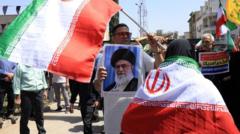Is the Targeting of the Quds Force a Sign of Cracks in Iranian Intelligence Security?

Understanding the Implications of Recent Assassinations on Iran's Military Structure
Recent events in the Middle East have sparked significant concern and discussion among military analysts and geopolitical experts. The reported assassinations of senior Iranian officials, Saeed Izadi and Behnam Shahryari, underscore a critical juncture for Iran's Islamic Revolutionary Guard Corps (IRGC) and its elite Quds Force. These events not only highlight the operational capabilities of foreign intelligence agencies but also reveal deep-seated vulnerabilities within Iran's intelligence and military apparatus.
The Significance of the Assassinations
The deaths of Izadi and Shahryari represent a substantial blow to the IRGC, particularly its Quds Force, which is responsible for extraterritorial operations and coordinating Iran's relationships with various armed groups in the region. These assassinations are indicative of a broader strategy aimed at undermining Iran’s influence and operational capabilities in the Middle East.
Key Figures and Their Roles
Saeed Izadi, identified as a senior commander within the Quds Force, played a pivotal role in coordinating Iranian support for groups like Hamas. His involvement in aiding these organizations has been substantial, especially in the context of the October 7, 2023, attacks on southern Israel. The Israeli military chief, Eyal Zamir, has emphasized that Izadi's assassination marks a significant turning point in what he describes as a "multi-front war."
Behnam Shahryari, on the other hand, headed Unit 190, which was integral in smuggling weapons and funds to Iranian regional proxies. His elimination through a drone strike further demonstrates the tactical precision and power of the intelligence operations aimed at the IRGC's leadership.
The Broader Context of Assassinations
The assassinations of high-ranking Iranian officials are not isolated incidents but rather part of an ongoing series of targeted killings. This trend has raised alarms regarding the internal security and intelligence capabilities of Iran. The growing trend of high-profile assassinations points to an apparent breach within Iran's intelligence community, leading to fears of further infiltration by foreign intelligence agencies, particularly Israel's Mossad.
The Role of Intelligence and Counterintelligence
In the wake of these assassinations, Iranian authorities have taken steps to bolster their internal security. Reports indicate a clampdown on communication methods among military personnel, including an order against using smartphones connected to the internet. This reaction indicates a level of paranoia within the Iranian leadership regarding further espionage and infiltration.
Infiltration and Espionage Concerns
With numerous arrests of individuals accused of spying for Mossad, including Afghan refugees, there are concerns that these accusations are being used to suppress dissent and stifle criticism of the IRGC and the government. The Iranian police have even urged citizens to report any suspicious activities regarding property rentals, suggesting an acute awareness of the potential for foreign agents operating within their borders.
Historical Precedents of Targeted Operations
The assassination of Izadi and Shahryari fits into a broader historical narrative of covert operations that have characterized Iran-Israel relations. Israel's intelligence agency, Mossad, has been implicated in numerous high-profile assassinations and sabotage operations against Iranian military and nuclear officials over the past two decades.
Notable Operations Against Iranian Officials
One of the most dramatic incidents occurred in 2018 when Mossad agents successfully infiltrated a secured warehouse in Tehran, extracting thousands of top-secret documents related to Iran's nuclear program. This operation stunned Iranian intelligence and demonstrated the depth of Israeli capabilities.
Moreover, the assassination of Mohsen Fakhrizadeh in 2020, a key figure in Iran's nuclear ambitions, was executed using a remote-controlled weapon, showcasing the advanced methods employed by Israeli operatives. Such operations have left Iranian leadership questioning their internal security and the effectiveness of their intelligence measures.
Implications for Iran's Military Operations
The ramifications of the recent assassinations extend beyond immediate tactical losses. They signal a potentially transformative period for Iran's military strategy and operational conduct. With the Quds Force facing leadership voids and intensified scrutiny, the effectiveness of Iran's support for regional proxies may be compromised.
Impact on Regional Dynamics
Iran's ability to project power and influence in the region, particularly through groups like Hezbollah and Hamas, could be hindered by these losses. The elimination of senior commanders disrupts established networks and operational planning, potentially leading to instability among Iran’s allies in the region.
The Evolving Nature of Conflict
Israel's preemptive strikes and targeted assassinations have evolved into a systematic approach to countering Iranian influence. This long-standing covert conflict, characterized by sabotage, cyber-attacks, and targeted killings, raises questions about the future of military engagements in the region.
Future of the IRGC and Quds Force
As the IRGC grapples with leadership challenges, the organization's ability to adapt and respond to these threats will be critical. Analysts suggest that Iran may need to rethink its strategies for regional engagement and military operations to counteract the growing efficacy of Israeli intelligence efforts.
Conclusion
The assassinations of Saeed Izadi and Behnam Shahryari highlight the precarious state of Iran's military and intelligence framework. As external pressures mount and internal security concerns rise, Iran's leadership faces a critical juncture in its approach to regional influence and military strategy. The evolving dynamics of conflict in the region raise important questions about the future trajectory of Iranian operations and the broader implications for Middle Eastern stability.
FAQs
What is the significance of the IRGC and Quds Force in Iran?
The IRGC plays a crucial role in Iran's military and political structure, with the Quds Force specifically focused on extraterritorial operations and supporting allied groups across the region.
How do assassinations affect Iran's military capabilities?
Assassinations of senior military leaders can disrupt command structures, hinder operational planning, and weaken Iran's ability to support its regional allies effectively.
What measures is Iran taking to enhance its internal security?
Iran has implemented stricter communication protocols among military personnel and has increased surveillance and policing to prevent espionage and infiltration.
As the situation unfolds in the Middle East, what implications do you think these events will have for regional peace and stability? #Iran #MiddleEast #Geopolitics
Published: 2025-06-21 13:37:13 | Category: technology



